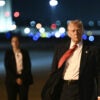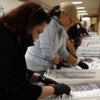Imagine the following scenario: After work you and a couple of your co-workers gather at the local pizza joint for a few slices and a beer. They are buying! When you arrive, one of your co-workers puts a “sign in” sheet (see below) under your nose while you are choosing what pizza you want to order. Congratulations! Under the rules of the dishonestly named Employee Free Choice Act (EFCA), you’ve just voted to unionize your workplace.
During Monday’s “Consequences of the Employee Free Choice Act” panel discussion at The Heritage Foundation, Rian Wathen, a former organizing director for United Food and Commercial Workers Local 700, described how, under EFCA, the above scenario, as well as other methods of “creative organizing,” will be used to pressure or deceive employees into joining a union once they no longer have the protection of a secret ballot.
Employers routinely refuse to recognize unions on a card-check–only basis because publicly signed cards do not reflect employees’ preferences. Instead, employers overwhelmingly prefer the issue of representation to be decided by secret ballot election. Such an election allows employees to consider both sides of the issue and, consequently, discourages the union from lying or engaging in “creative organizing” just to get a card signed because the worker can later vote “no” once they have had time to reflect on what they signed.

An employee signature for card-check purposes can be obtained in several ways. For instance, Wathen described how organizers visit employees’ homes and use high-pressure sales tactics, such as the SPIN technique, to extract a signed check card.
The Daily Signal depends on the support of readers like you. Donate now
As Mr. Wathen noted, organizers “are promoted by bringing in new dues paying members…the person who brings in most cards, by hook or by crook, is the person who looks productive and gets promoted.” Consequently organizers have one goal: Recruit as many new dues paying union members as possible.
While the current union-election process can mitigate the effects of high-pressure sales techniques, under EFCA, workers who have been deceived by such “creative” organizing will no longer have an opportunity to gather all the facts and make a truly informed decision regarding union organizing.
Big Labor, however, continues to insist it supports EFCA because of the alleged need to redress employers’ subversion of the electoral process by intimidating employees. Yet, as Homer L. Deakins, Jr., a shareholder of Ogletree Deakins and another participant in Monday’s discussion, notes, there are “fewer acts of misconduct on the part of management in union elections today than there were back in the days when labor was strong. Labor unions are winning more elections today than they won in the 60s, 70, 80s, or 90s.”
So what gives? According to Deakins, “Unions aren’t organizing” the way they used to and are no longer willing to the spend money to do so. Of course, why spend money on organizing, if you can simply strong-arm employees through “creative organizing” tactics.
Click here to watch the event in its entirety.






























